Block Those Flying Fish: Great Lakes Politicians Pressure Illinois, Washington on Asian Carp
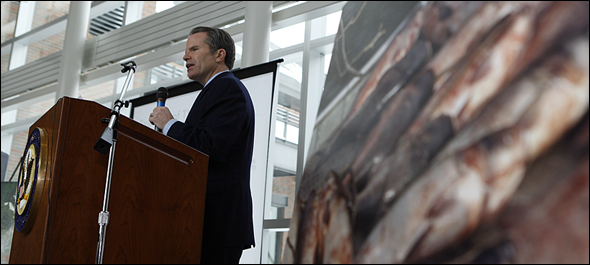
Michigan’s attorney general and U.S. Rep. Dave Camp host a second event to rally support in Traverse City.
By Steve Kellman
Circle of Blue
More than 100 anglers, business executives and residents packed the glass atrium at Northwestern Michigan College’s Hagerty Conference Center last week to hear Michigan’s attorney general describe the threat to the Great Lakes from Asian carp—an ugly and voracious jumping fish that’s banging on the door to the world’s largest body of clean, fresh water.
The Feb. 17 meeting was the second gathering of state and federal officials in Traverse City in the last two weeks. Great Lakes politicians have been rallying the public’s support to seal off Chicago-area locks that are thought to be entryways to the lakes for the invasive species. The effort is part of a broader legal push to seal off the century-old Chicago Waterway System from the Great Lakes, ending the back-and-forth migration of various invasive species that have plagued the lakes and Mississippi River system for decades.
Posters of the menacing fish, in all their gape-mouthed glory, served as the meeting’s backdrop. The snowy shore and choppy grey waters of Grand Traverse Bay dominated the view through the two-story glass wall, extending into the distance where the bay joins the rest of Lake Michigan.
Asian carp, which can weigh up to 100 pounds and grow up to four feet long, have overtaken large stretches of the Mississippi and Illinois rivers since being imported into the U.S. While no one is sure how well they would adapt to the colder, deeper waters of the Great Lakes, experts say the risk of major damage is too great.
A Flipping, Flying Aquatic Menace
Kelley Smith, fisheries division chief for the Michigan Department of Natural Resources & Environment, told attendees at the meeting last week that the carp would place an added burden on an ecosystem already stressed by the invasive zebra mussel and quagga mussel. The bighead variety of Asian carp can eat up to 40 percent of their weight in plankton each day. While the fish may not overrun the deeper parts of Lake Michigan, they may be right at home in the many rivers and streams that flow into the lake, and could affect the fishing there.
“Even if these carp don’t affect fishing in those rivers, they will affect the boaters,” Smith said. The silver variety of Asian carp—which can weigh up to 40 pounds—are known for jumping in the air at the sound of motors, injuring boaters and knocking them out of their boats.
On Feb. 6, four state representatives—Gary McDowell (D-Rudyard), Andy Neumann (D-Alpena), Dan Scripps (D-Leelanau), and Wayne Schmidt (R-Traverse City)—gathered on the banks of the Boardman River to discuss how the invasive fish threatens the Great Lakes’ ecosystem. The legislators used the occasion to announce the launch of a Web site backed by Michigan House Democrats-—NoAsianCarp.com—-with a petition urging Illinois officials to close the locks.
The Web site is joined by a similar project from Michigan Attorney General Mike Cox, StopAsianCarp.com, which has its own petition that calls on President Obama and the U.S. Congress to close the locks. Cox, a Republican, is a candidate for governor.
A Rare Issue That Unites Both Parties
While the earlier riverside rally was dominated by Democrats, and the more recent Hagerty Conference Center meeting was led by Republicans, speakers at both gatherings insisted that the issue has galvanized both parties. Officials have also argued that the state’s two political parties are united in sealing off the waterways.
U.S. Representative Dave Camp, a Republican from Michigan, opened Wednesday’s meeting with a history of the Asian carp’s long migration up the Mississippi River and a review of his recently introduced CARP ACT (Close All Routes and Prevent Asian Carp Today) legislation, which would close the locks, install other protections and mitigate any impact on Chicago commerce.
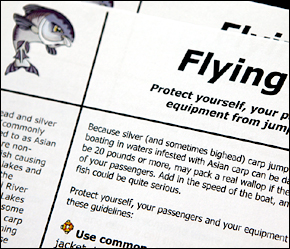
“This legislation has support from both Republicans and Democrats in Michigan, New York, Ohio and Wisconsin,” Camp said, noting that Sen. Debbie Stabenow (D-Mich.) has introduced a companion bill in the U.S. Senate.
Asian carp have been ranked the most threatening invasive species in the world, Camp said. He also rattled off what’s at stake if fish take over the Great Lakes region, including a $7 billion sportfishing industry, a $9 billion boating industry, as well as the 800,000 jobs that both support.
Attorney General Cox praised Democratic Governor Jennifer Granholm for her work to get the locks to be closed immediately and for disapproving of the federal government’s inaction against the fish. He also noted that his legal efforts have drawn support from most of the other Great Lakes states.
While the Republican attorney generals of Pennsylvania and Wisconsin as well as the Democratic attorney generals of New York, Ohio and Minnesota have supported Michigan’s stance, Indiana’s Republican leadership remains split on the issue. Indiana Republican Governor Mitch Daniels opposes closing the locks while the state’s Republican Attorney General Greg Zoeller has filed a court brief supporting Cox’s legal actions.
Illinois Leaders Push Back
Only political officials in Illinois, home to the carp-infested waterways in question, are united in opposing the immediate closure of the locks. And while President Obama, a resident of Chicago who represented Illinois in the state and U.S. Senate, initially sided with Illinois on the issue, he is now taking on a middle-ground approach.
Federal authorities have backed the $78.5 million Asian Carp Control Strategy Framework, which outlines 24 recommendations for battling the carp. The federal government also supports more research on the potential economic and environmental effects the fish will have on the lake. Once results are in, the administration said it could support closing the locks by April at the earliest. The framework document notes, however, that even with the locks closed carp may still be able to get through since the structures are not watertight.
At a Feb. 12 EPA hearing in Chicago, where dozens of local businesspeople and boat captains railed against the possibility of any lock closures, Congresswoman Judy Biggert (R-Hinsdale) warned that such closures would have an “absolutely devastating impact” on the local, regional and national economy, and result in “massive flooding” and high unemployment.
Meanwhile Cox deemed those arguments as “dramatically overstated” at the Traverse City rally, noting that a study by Dr. John C. Taylor, a transportation expert with Wayne State University, pegged the maximum economic impact of lock closures at $70 million. Dr. Taylor’s study found that the closures would likely result in an increase in jobs overall as other transportation sources take up the slack on the region’s already-declining barge industry.
Washington Slow to Respond
Cox also said that the locks could be opened on an emergency basis to guard against flooding, which has historically happened an average of once every 10 years. Rep. Camp’s CARP ACT legislation also allows for emergency opening of the locks.
While Cox had words of praise for the $78.5 million Asian carp control plan, he noted that only about $9 million of the funding is new. He urged meeting attendees to push for faster federal action, and said StopAsianCarp.com is one way of doing so, “to activate the citizen militia, as it were.”
A lack of urgency from Washington is nothing new, Cox added. “The Bush administration was really slow on addressing this issue as well,” he said. “We’ve all been pushing Washington over a number of years.”
Steve Kellman is a Circle of Blue writer and reporter. Reach him at circleofblue.org/contact.
Read More: Q&A: Michigan Attorney General Talks about Asian Carp, Q&A : U.S. Congressman Dave Camp On Asian Carp


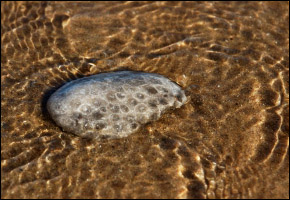

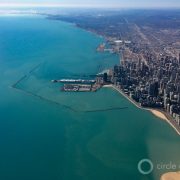
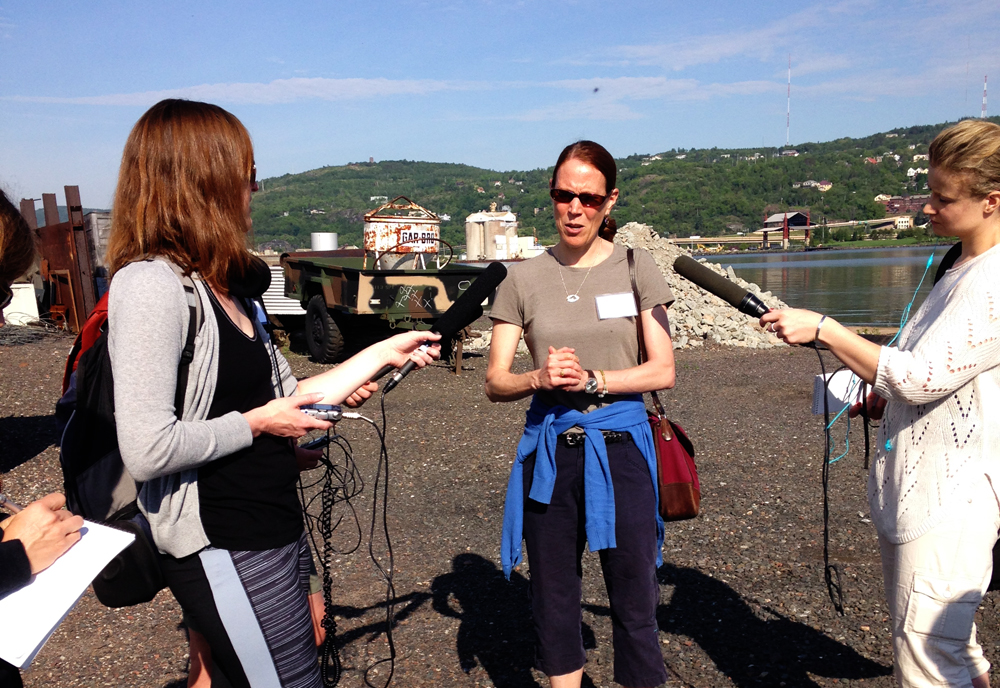

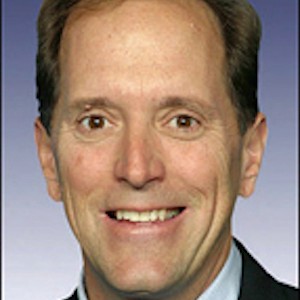

Leave a Reply
Want to join the discussion?Feel free to contribute!